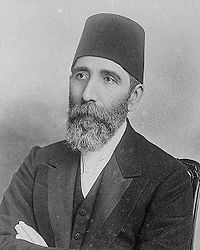- Hüseyin Hilmi Pasha
-
Hüseyin Hilmi Pasha Hüseyin Hilmi PashaMandats Inspecteur-Général de Macédoine 1902 – 1908 Grand vizir de l'Empire Ottoman 14 février 1909 – 13 avril 1909 Président Abdülhamid II Prédécesseur Kıbrısli Mehmet Sait Pasha Successeur Ahmet Tevfik Pasha Grand vizir de l'Empire Ottoman 5 mai 1909 – 28 décembre 1909 Président Mehmed V Prédécesseur Ahmet Tevfik Pasha Successeur İbrahim Hakkı Pasha Ministre de l'Intérieur de l'empire Ottoman 1908 – 1909 Ambassadeur Ottoman à Vienne 1912 – 1918 Biographie Date de naissance 1er avril 1855 Lieu de naissance Lesbos, Grèce, Empire Ottoman Date de décès 1922 Lieu de décès Vienne, Autriche Nationalité Ottomane[1] Religion Musulman modifier 
Hüseyin Hilmi Pasha (1er avril 1855, Lesbos — 1922, Vienne) est un homme d'état et deux fois Grand vizir[2] de l'Empire Ottoman au début de la Seconde Ère Constitutionnelle. Il est aussi le fondateur du Croissant-Rouge Turque[3]. Hüseyin Hilmi est un de meilleurs administrateurs des Balkans au début du XXe siècle en tant qu'Inspecteur-Général Ottoman de Macédonie[4] de 1902 à 1908. Il occupe les fonctions de Ministre de l'Intérieur[5] de 1908 à 1909 et d'ambassadeur Ottoman à Vienne[6] de 1912 à 1918.
Sommaire
Biographie
Hüseyin Hilmi Pasha nait en 1855 à Lesbos (Midilli) dans une famille d'origine grecque[1],[7],[8],[9] convertie à l'Islam[10]. Il fait le début de sa scolarité à Lesbos où il acquiert un bon niveau de français. Il débute comme clerc dans l'administration ottomane et grimpe rapidement les échelons de la hiérarchie. Il devient gouverneur d'Adana en 1897 et gouverneur du Yemen en 1902. Il est nommé la même année inspecteur-général avec des responsabilirés sur tous les territoires ottomans des balkans, c'est-à-dire à l'époque le vilayet de Salonique, le Kosovo et Manastir (Bitola).
Après la révision de la constitution ottomane en 1908 il est nommé au poste de Ministre de l'Intérieur. Il devient Grand Vizir du 14 février 1909 au 13 avril 1909 sous le règne d'Abdülhamid II. Hüseyin Hilmi Pasha est le dernier Grand Vizir d'Abdülhamid II. Il doit quitter ce poste lors de l'incident du 31 mars où durant un mois les fondamentalistes tiennet les rues d'Istanbul jusqu'à l'arrivée de l'armée de Salonique. Il redevient Grand Vizir du 5 mai 1909 au 28 décembre 1909.
Il succède également à Gazi Ahmed Muhtar Pasha au poste de Ministre de la Justice. Il est nommé Ambassadeur Ottoman à Vienne en Autriche en octobre 1912, poste qu'il occupe jusqu'à la fin de la Seconde Guerre Mondiale.
À cause de problèmes de santé, il reste à Vienne jusqu'à sa mort en 1922. Il est enterré à Beşiktaş, Istanbul.
Notes et références
- (en) Cet article est partiellement ou en totalité issu de l’article de Wikipédia en anglais intitulé « Hüseyin Hilmi Pasha » (voir la liste des auteurs)
- (en) Prothero, George Walter, Peace Handbooks: The Balkan states, H. M. Stationery Office, 1920 (OCLC 4694680), p. 45 :
« Hussein Hilmi Pasha, descended from a Greek convert to Islam in the island of Mitylene, was sent to Macedonia as High Commissioner. »
- Archivum ottomanicum v. 23, Mouton, 2006, p. 272 :
« Hüseyin Hilmi (1855-1923), who was to become Grand Vezir twice in 1909 »
- (en) Trivedi, Raj Kumar, The critical triangle: India, Britain, and Turkey, 1908-1924, Publication Scheme, 1994 (OCLC 31173524), p. 77 :
« the Ottoman Red Crescent Society of which Hilmi Pasha was the head, which he said, utilized their money for the purpose for which it had been contributed by Muslims in India. »
- (en) Kent, Marian, The Great Powers and the End of the Ottoman Empire, Routledge, 1996, 2e éd., poche (ISBN 978-0-7146-4154-6) (LCCN 95021912), p. 227 :
« Hüseyin Hilmi Pasha (1855-1923) (Ottoman Inspector-General of Macedonia, 1902-8 »
- (en) Kent, Marian, The Great Powers and the End of the Ottoman Empire, Routledge, 1996, 2e éd., poche (ISBN 978-0-7146-4154-6) (LCCN 95021912), p. 227 :
« Hüseyin Hilmi Pasha (1855-1923) Minister for the Interior, 1908-9) »
- (en) Kent, Marian, The Great Powers and the End of the Ottoman Empire, Routledge, 1996, 2e éd., poche (ISBN 978-0-7146-4154-6) (LCCN 95021912), p. 227 :
« Hüseyin Hilmi Pasha (1855-1923) Ambassador to Vienna, 1912-18 »
- (en) Current Literature, Current Literature Pub. Co, 1909 (OCLC 4604506), p. 389 :
« His Excellency Hussein Hilmi Pacha is a Turk "of the isles." The politest Turks of all come from the isles. There is also Greek blood in his veins, »
- (en) Great Britain. Foreign Office. Historical Section, Handbooks prepared under the direction of the Historical section of the foreign office, H.M. Stationery off., 1920 (OCLC 27784113), p. 45 :
« Hussein Hilmi Pasha, descended from a Greek convert to Islam in the island of Mitylene, was sent to Macedonia as High Commissioner. »
- (en) Abbott, George Frederick, Turkey in transition, E. Arnold, 1909 (OCLC 2355821), p. 149 :
« For Hilmi is a novus homo. A native of Mytilene, of obscure origin, partly Greek, he began his career as secretary to Kemal Bey »
- (en) Prothero, George Walter, Peace Handbooks: The Balkan states, H. M. Stationery Office, 1920 (OCLC 4694680), p. 45 :
« Hussein Hilmi Pasha, descended from a Greek convert to Islam in the island of Mitylene. »
Sources
- (en)Emine Onhan Evered, "An educational prescription for the Sultan: Huseyin hilmi pasa's advice for the maladies of empire," Middle Eastern Studies, 43,3 (2007), 439-459.
Voir aussi
Catégories :- Naissance en 1855
- Décès en 1922
- Histoire de la Turquie
- Personnalité politique turque
- Grand vizir ottoman
- Naissance à Lesbos
- Ambassadeur turc
Wikimedia Foundation. 2010.

